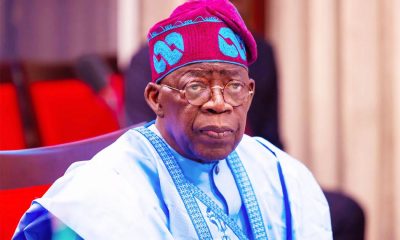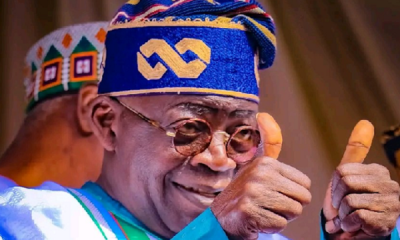Opinion
Untold Tales About Tinubu’s F9, A1 ‘Results’
By Emmanuel Aziken

The fine print of the agreement reconciling Governor Siminilayi Fubara of Rivers State and his estranged political godfather, Nyesom Wike, was, as of press time, yet to be spelled out.
It is, however, dead-on to say that the agreement came at a point in time that presidential historians may consider as the defining point in the Bola Ahmed Tinubu presidency.
Earlier in the week, Vanguard published an interview with 2023 Social Democratic Party, SDP, presidential candidate, Adewole Adebayo, who scored President Tinubu an A1 in politics and remarkably, an F9 in governance.
The quiet supremacy Tinubu carved for himself in the polity with total hegemony over the executive and legislative branches of government may be the recommendation for the A1 he was scored in politics.
Today, unlike never before in Nigerian history or, even any other country practising the presidential system, National Assembly presiding officers have turned themselves into errand boys of the president, even officially representing him at official engagements.
When the executive tells them to jump, they no longer question why, but how high they should jump. Noting indeed symbolises the erosion of that autonomy of the legislature than a presiding officer reading a prepared speech of the president in an official ceremony.
In the week under review, the supineness of the legislative branch was further brought to bear when the two chambers of the National Assembly shockingly extended the implementation of the 2024 Appropriation Act to December 2025.
By that extension, the lawmakers who set the rules agreed with the executive on its failure to implement a budget it set out almost two years ago. Budget discipline, it must be said, is the framework for anybody, human or organsiational, who wants to succeed in any set endeavour.
Housewives who ordinarily would want to buy the whole market constrain themselves to the household fund and maximise same to the benefit of the household. So it is in every right-working country, and even in autocracies. Managing your money is an appropriate measure of defining the success or otherwise of a relationship.
In this wise, that the government was unable to manage the fiscal estimates for 2024 and cavalierly passed on implementation of same to 2025 was grossly reckless. Going further to extend the implementation of the 2024 budget to the end of 2025 makes mockery of Nigeria’s fiscal framework. What it means is that Nigeria is perhaps the only country in the world operating two budgets at the same time!
That perhaps explains in part why Adebayo scored Tinubu an F9 in governance. There are many other parameters where he could also be scored by his critics with a similar grade. Travelers on the Abuja – Asaba route may even score the government worse. Insecurity is another challenge where the administration will undoubtedly have a bad score.
However, the reinvention of the political wheel that saw Tinubu, the leader of the All Progressives Congress, APC, mediating in the crisis between Peoples Democratic Party, PDP, actors in Rivers State is evidently one measure for his A1 grade in politicking as scored by Adebayo.
Seeing the political contenders in Rivers State, all of whom still claim membership of the PDP, submit themselves to the political lordship of Tinubu, the APC leader, is shocking. It is even more shocking that both Fubara and Minister Nyesom Wike had for long been championing the re-election of the APC’s Tinubu.
The president has totally demystified the political symmetry to the extent that, despite hardship all over the land, he has become the main talking point for the 2027 election. The political equilibrium that had hitherto seen the PDP as the preeminent partisan chorus in the South-South has now broken into a cacophony with those who once demonised the APC making unmelodious vibrations about Tinubu’s wonders.
The only state in the South-South now fully left out of Tinubu’s swing is perhaps Bayelsa State. With Fubara suspended, Bayelsa is the only state now flying the flag of the PDP in the former homeland of the opposition.
However, even if the president has failed in several areas of governance, the good thing is that failure need not be his legacy. He has room for improvement. It is in this direction that one sees the new tax laws that the president signed last Thursday as a fitting point for reinvention.
Tinubu must be commended for the foresight in proposing the laws, even if geopolitics caused the proposals as envisaged to be watered down. He must also be commended for his grit and grace in conceding to his critics.
The prospects of the laws being implemented to the letter and the opportunities that come along are so far-reaching that they may well revolutionise the economic base of the country.
The economic gains that will come by increasing the tax threshold for working individuals and businesses are laudable. Not only will the reform keep more money in the hands of more people, it will also indirectly incentivise low-income businesses with less than N50m annual revenues to produce more. Even more interesting in the tax reform is the drastic reduction of multiple taxes and indirect fees that directly impact against small businesses.
President Tinubu must work with governors to ensure that they build on this positive legacy. If he is able to see through the genuine intentions of the tax reforms, perhaps those who score him low in governance may have something good to erase the bad score.
Send Us A Press Statement Advertise With Us Contact Us
And For More Nigerian News Visit GWG.NG













